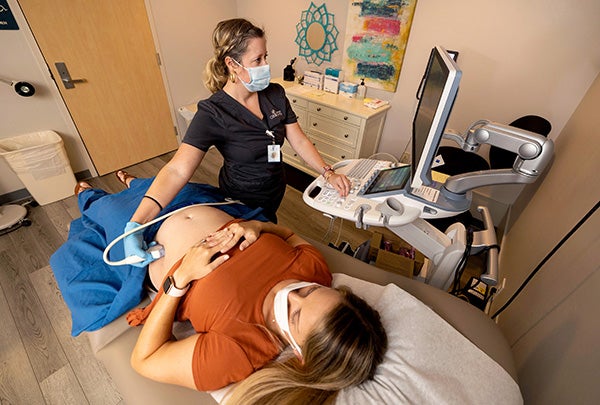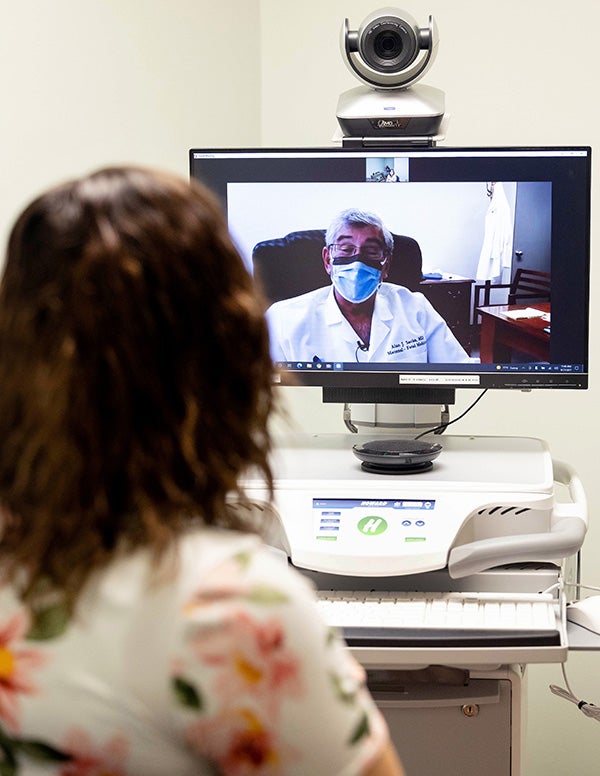ECU’s pregnancy health program expands to three counties

Stephanie Fiust, who has a high-risk pregnancy, receives an ultrasound at Carteret Ob-Gyn. (Photos by Rhett Butler)
Over a year in, an innovative program that combines telemedicine, telepsychiatry and nutrition support is increasing access to health care for North Carolina mothers and improving health outcomes for their babies. The MOTHeRS Project at East Carolina University was established in 2020 with a $1.2 million investment from United Health Foundation. MOTHeRS stands for Maternal Outreach Through Telehealth for Rural Sites.
The program specifically looks to help rural women with high-risk pregnancies who would otherwise have to travel up to two hours each way to receive care at ECU clinics. ECU is the only source for high-risk prenatal care in the region.
In addition to geography, there are significant challenges pregnant women in rural areas face when accessing comprehensive, affordable health care. Among them:
- One in four mothers in eastern North Carolina lives in poverty; one in eight is uninsured.
- North Carolina has a higher-than-average rate of maternal mortality. North Carolina also has a high rate of infant mortality and low birthweights.
- Ninety of the 100 counties in the state are designated as mental health provider shortage areas.
“Maternal health outcomes in the United States have reached crisis levels compared with the rest of the world. Here in North Carolina, we continue to find that this has been exacerbated by the pandemic as many expectant and new moms experience increased poverty, transportation difficulties, food insecurity and lack of access to care,” said Anita Bachmann, CEO, UnitedHealthcare Community Plan of North Carolina, a UnitedHealth Group company. “We are committed to addressing these issues and this partnership with East Carolina University is allowing us to do just that by increasing access to quality care and resources to meet some of the very basic needs for a healthy mother and healthy baby.”
Telemedicine, telepsychiatry and nutrition support services were first offered to patients at primary care obstetric clinics in Carteret County and have since expanded to clinics in Duplin and Chowan counties. Through formalized partnerships with clinics, patients in the practices are cared for by both an ECU specialist and their local physician through a combination of telehealth and face-to-face visits.

Stephanie Massey visits Carteret Ob-Gyn for a telemedicine call with Dr. Alan Sacks, a maternal fetal medicine specialist at ECU. (Photo by Rhett Butler)
At Carteret Ob-Gyn in Morehead City, about 15% of the pregnant patients are high risk, said Dr. Nicole D’Andrea. The pandemic has made it more difficult for them to coordinate appointments, she added. Partnering with ECU and the MOTHeRS project allows patients to go to the clinic they are familiar with and get the care they need. Physicians there can consult with specialists on patient care plans; provide quiet, private rooms for telepsychiatry visits; and screen patients for food insecurity all in one place. If patients screen positive, the clinic has a cache of food bags filled with pasta, canned goods and formula for them to take home.
“We have an influx of people who don’t have the time, the money or the resources to go far away for quality care. So, I hope that this project continues forever so that we can keep more patients and their babies healthy,” D’Andrea said.
Carteret Ob-Gyn patient Stephanie Fiust of Morehead City has had telehealth visits for her high-risk pregnancy with Dr. Alan Sacks, a maternal fetal medicine specialist and clinical professor at ECU’s Brody School of Medicine. “Being considered high risk is very scary. The only thing you want to hear when you’re pregnant is that you’re healthy as the mom and that your baby is healthy. So having a support network with the doctors that I know has been crucial for setting my mind at ease,” she said.
The MOTHeRs Project’s ability to offer enhanced access to maternal health services and reduce geographic health disparities dovetails with the missions of the Brody School of Medicine and United Health Foundation. More than 32% of Brody graduates plan to work primarily in underserved areas, compared to 23% of all U.S. medical school graduates. This is especially important during the pandemic, which has contributed to health disparities, particularly among minority communities. The investment from the United Health Foundation, a charitable organization of UnitedHealth Group, is part of its effort to fight COVID-19, support impacted communities and address emerging health care issues related to the pandemic.
“We’re very fortunate that United Health Foundation recognized the need in our rural health community that was very hard hit by the pandemic. We’re enormously appreciative and very thankful for everything they’ve done,” Sacks said.
Through its ongoing work, the MOTHeRS Project expects not only to provide care to those who need it, but also to generate new knowledge regarding how barriers to care can be better addressed. It aims to be a national model to ensure that every woman in rural America has a safe and healthy pregnancy and delivery.
###
ECU News Services
Howard House, 1001 E. Fifth Street
Greenville, NC 27858
ecunews@ecu.edu
Phone: 252-328-6481
news.ecu.edu
Contact: Erin Ward
Telephone: 252-737-1505